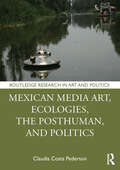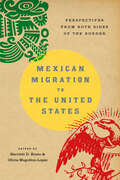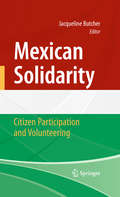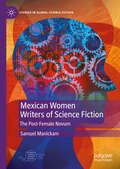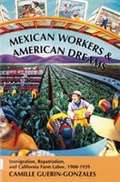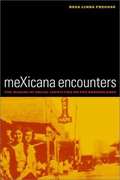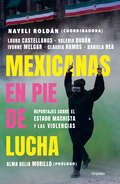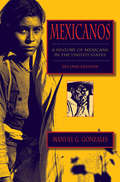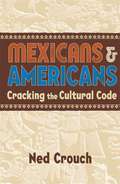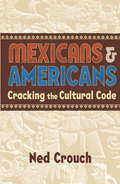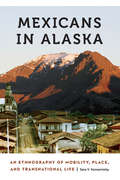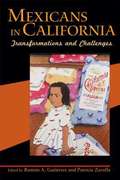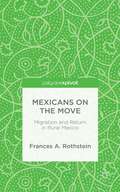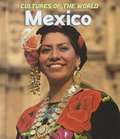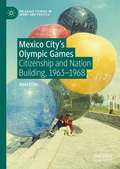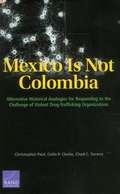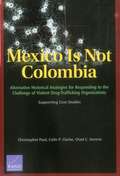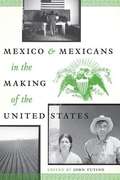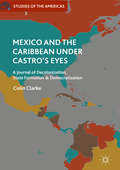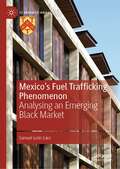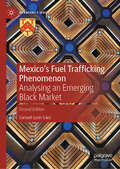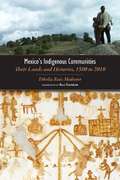- Table View
- List View
Mexican Media Art, Ecologies, the Posthuman, and Politics (Routledge Research in Art and Politics)
by Claudia Costa PedersonThis volume focuses on the connection between ecological thought and the technological arts in Mexico in order to challenge assumptions that ecological thought is a domain exclusive to the arts of the Global North and reconceive it as an inventive nexus of materialist speculations into a global posthuman world.Tracking the concept of ecology through a series of case studies taken from the histories of new media arts in Mexico over the last 50 years (from the mid-twentieth century to the present), this book differs from ecological art histories that either ignore technological art or associate it exclusively with the Global North. It includes artists and collectives working both in Mexico and transnationally and examines collaborative projects responding to anthropogenic environmental degradation in Mexico and elsewhere.The book will be of interest to scholars working in art history, Latin American studies, media studies, and environmental studies.
Mexican Migration to the United States: Perspectives From Both Sides of the Border
by Harriet D. RomoBorderlands migration has been the subject of considerable study, but the authorship has usually reflected a north-of-the-border perspective only. Gathering a transnational group of prominent researchers, including leading Mexican scholars whose work is not readily available in the United States and academics from US universities, Mexican Migration to the United States brings together an array of often-overlooked viewpoints, reflecting the interconnectedness of immigration policy. This collection’s research, principally empirical, reveals significant aspects of labor markets, family life, and educational processes. Presenting recent data and accessible explanations of complex histories, the essays capture the evolving legal frameworks and economic implications of Mexico-US migrations at the national and municipal levels, as well as the experiences of receiving communities in the United States. The volume includes illuminating reports on populations ranging from undocumented young adults to elite Mexican women immigrants, health-care rights, Mexico’s incorporation of return migration, the impact of Deferred Action for Childhood Arrivals on higher education, and the experiences of young children returning to Mexican schools after living in the United States. Reflecting a multidisciplinary approach, the list of contributors includes anthropologists, demographers, economists, educators, policy analysts, and sociologists. Underscoring the fact that Mexican migration to the United States is unique and complex, this timely work exemplifies the cross-border collaboration crucial to the development of immigration policies that serve people in both countries.
Mexican Migration to the United States: Perspectives From Both Sides of the Border
by Harriet D. RomoThis anthology examining borderlands migration brings together the perspectives of Mexican and US scholars from a variety of fields. Gathering a transnational group of prominent researchers, including leading Mexican scholars whose work is not readily available in the United States, this collection brings together an array of often-overlooked viewpoints, reflecting the interconnectedness of immigration policy. These essays reveal significant aspects of labor markets, family life, and educational processes. They capture the evolving legal frameworks and economic implications of Mexico-US migrations at the national and municipal levels, as well as the experiences of receiving communities in the United States. The volume includes illuminating reports on populations ranging from undocumented young adults to elite Mexican women immigrants, health-care rights, Mexico&’s incorporation of return migration, the impact of Deferred Action for Childhood Arrivals on higher education, and the experiences of young children returning to Mexican schools after living in the United States. Reflecting a multidisciplinary approach, the list of contributors includes anthropologists, demographers, economists, educators, policy analysts, and sociologists. Underscoring the fact that Mexican migration to the United States is unique and complex, this timely work exemplifies the cross-border collaboration crucial to the development of immigration policies that serve people in both countries.
Mexican Solidarity
by Jacqueline ButcherThis book offers a new look at Mexican civil society, through a rigorous quantitative and qualitative analysis of volunteering in Mexico. The findings of this study, with new methodologies specifically tailored to the unique nature of Mexican volunteerism contradict previous studies that considered Mexico's Third Sector one of the smallest and least developed worldwide. American or European models of studying the Third Sector do not accurately translate to the study of Mexico, and the author of this key volume has developed a new and important model of study. The results of this study will provide key insights about the growing Third Sector in Mexico, including: the concept of volunteering in Mexico, case studies of Non-Profit Organizations in Mexico, findings, Challenges, and Implications of this Study, detailed outline of the Methodology, technological Support for Information Gathering. The results and methodology of this groundbreaking study will be invaluable not only to researchers studying the Third Sector in Mexico, but those studying other analogous cultures that do not fit into traditional American or European models.
Mexican Women Writers of Science Fiction: The Post-Female Novum (Studies in Global Science Fiction)
by Samuel ManickamThis book is the first to offer an in-depth scholarly study of Mexican women writers of science fiction and highlight their innovative contributions to the growth and development of the genre in Mexico. By conducting close readings of twenty short stories authored by Mexican women from the 1950s to the present, Manickam reveals what women writers can do with science fiction that they cannot with "more traditional genres", what new paradigms of female agency are apparent in science fiction, and the insights science fiction provide us regarding Mexican women's negotiations with modernity. In so doing, he demonstrates how Mexican women writers reimagine traditional icons of science fiction to creatively explore what it means to be a modern woman relinquishing traditional feminine roles to enter new technology-informed domains once occupied almost solely by men.
Mexican Workers and American Dreams: Immigration, Repatriation, and California Farm Labor, 1900-1939 (Class And Culture)
by Camille Guerin-GonzalesIn the first forty years of this century, over one million Mexican immigrants moved to the United States, attracted by the prospect of farm work in California. They became workers in industrial agriculture --barely recognized, never respected, and poorly paid. Native white American workers did not resent the Mexicans during prosperous times, when everyone who wanted to work could do so. But during the Great Depression, native workers began to realize that many of the Mexican workers were here to stay. <p><p> Native workers, blaming their unemployment on the immigrants, joined with government officials to demand that Mexican workers and their families return to Mexico. During the 1930s, the federal government and county relief agencies cooperated in a nasty repatriation program, forcing half a million Mexicans living in the U.S. to return to Mexico. <p> Camille Guerin-Gonzales tells the story of their migration, their years here, and of the repatriation program--one of the largest mass removal operations ever sanctioned by the U.S. government. She documents both their efforts to resist and the overpowering forces that worked against them.
Mexicana Encounters: The Making of Social Identities on the Borderlands
by Rosa Linda FregosoMexicana Encounters charts the dynamic and contradictory representation of Mexicanas and Chicanas in culture. Fregoso's self-reflexive approach to cultural politics embraces the movement for social justice and offers new insights into the ways that racial and gender differences are inscribed in cultural practices.
Mexicanas en pie de lucha: Pese al gobierno machista, las violencias y el patriarcado
by Laura Castellanos Valeria Durán Daniela Rea Nayeli Roldán Claudia Ramos Ivonne MelgarA menudo pienso que ese “si tocan a una, respondemos todas” entraña una verdad perturbadora, es así porque todas o casi —nueve de cada diez, dirán las estadísticas— hemos sufrido algún tipo de violencia. ¿O de qué tamaño es el espectro de lo que no vemos, de lo que aún no se ha contado? ¿Cuántas historias caben entre la de esa anciana que camina encorvada por las calles, con el cuerpo roto por su marido y Fátima, la niña de doce años que no pudo recoger su premio de declamación de poesía? —alma delia murillo El ESTADO MACHISTA y sus decisiones, el covid-19, la crisis económica subsecuente y la violencia brutal se han ensañado con las mexicanas. Ante esto, la palabra y la sororidad, los datos irrefutables, la explicación, la inteligencia y el diálogo son sus armas. En esta obra, seis periodistas de primer nivel —coordinadas por Nayeli Roldán, ganadora del premio Ortega y Gasset y del Premio Nacionalde Periodismo 2018— ofrecen reportajes que retratan, con sensibilidad combativa, la situación actual de las mujeres, las consecuencias de las políticas públicas vigentes, el estado de las luchas feministas y los escenarios que se avizoran.
Mexicanos, Second Edition
by Manuel G. GonzalesNewly revised and updated, Mexicanos tells the rich and vibrant story of Mexicans in the United States. Emerging from the ruins of Aztec civilization and from centuries of Spanish contact with indigenous people, Mexican culture followed the Spanish colonial frontier northward and put its distinctive mark on what became the southwestern United States. Shaped by their Indian and Spanish ancestors, deeply influenced by Catholicism, and tempered by an often difficult existence, Mexicans continue to play an important role in U.S. society, even as the dominant Anglo culture strives to assimilate them. Thorough and balanced, Mexicanos makes a valuable contribution to the understanding of the Mexican population of the United States--a growing minority who are a vital presence in 21st-century America.
Mexicans & Americans: Cracking the Cultural Code
by Ned CrouchWhether negotiating a delivery date, launching a local franchise or renting a car in Mexico City, speaking the language and knowing the rules of business are not enough. In any culture where yes can mean no-or sometimes maybe-even giants like Wal-Mart and IBM can make costly mistakes. Mexicans and Americans gets to the heart of our differences and lays the groundwork for cultural fluency. Here is a humorous and insightful firthand look at how to succeed in working with Mexicans-on either side of the border. Steeped in the richness of Mexican culture and history, Ned Crouch helps us understand the most critical elements that determine what works and what doesn't when Mexicans and Americans come together in business: out different views of time and space, and our construction and use of language. He debunks the manana stereotype and offers specific advice on how to cross the cultural divide that separates us.
Mexicans & Americans: Cracking the Cultural Code
by Ned CrouchWhether negotiating a delivery date, launching a local franchise or renting a car in Mexico City, speaking the language and knowing the rules of business are not enough. In any culture where yes can mean no—or sometimes maybe—even giants like Wal-Mart and IBM can make costly mistakes. Mexicans and Americans gets to the heart of our differences and lays the groundwork for cultural fluency. Here is a humorous and insightful firthand look at how to succeed in working with Mexicans—on either side of the border. Steeped in the richness of Mexican culture and history, Ned Crouch helps us understand the most critical elements that determine what works and what doesn’t when Mexicans and Americans come together in business: out different views of time and space, and our construction and use of language. He debunks the manana stereotype and offers specific advice on how to cross the cultural divide that separates us.
Mexicans in Alaska: An Ethnography of Mobility, Place, and Transnational Life (Anthropology of Contemporary North America)
by Sara V. KomarniskyMexicans in Alaska analyzes the mobility and experience of place of three generations of migrants who have been moving between Acuitzio del Canje, Michoacán, Mexico, and Anchorage, Alaska, since the 1950s. Based on Sara V. Komarnisky’s twelve months of ethnographic research at both sites and on more than ten years of engagement with the people in these locations, this book reveals that over time, Acuitzences have created a comprehensive sense of orientation within a transnational social field. Both locations and the common experience of mobility between them are essential for feeling “at home.” This migrant way of life requires the development of a transnational habitus as well as the skills, statuses, and knowledge required to live in both places. Komarnisky’s work presents a multigenerational and cross-continental understanding of the contemporary transnational experience.Mexicans in Alaska examines how Acuitzences are living, working, and imagining their futures across North America and suggests that anthropologists look across borders to see how broader structural conditions operate both within and across national boundaries. Understanding the experiences of transnational migrants remains a critical goal of contemporary scholarship, and Komarnisky’s analysis of the complicated lives of three generations of migrants provides depth to the field.
Mexicans in California: Transformations and Challenges
by Patricia Zavella Ramon A. GutierrezNumbering over a third of California's population and thirteen percent of the U.S. population, people of Mexican ancestry represent a hugely complex group with a long history in the country. Contributors explore a broad range of issues regarding California's ethnic Mexican population, including their concentration among the working poor and as day laborers; their participation in various sectors of the educational system; social problems such as domestic violence; their contributions to the arts, especially music; media stereotyping; and political alliances and alignments. Contributors are Brenda D. Arellano, Leo R. Chavez, Yvette G. Flores, Ramón A. Gutiérrez, Aída Hurtado, Olga Nájera-Ramírez, Chon A. Noriega, Manuel Pastor Jr., Armida Ornelas, Russell W. Rumberger, Daniel Solórzano, Enriqueta Valdez Curiel, and Abel Valenzuela Jr.
Mexicans in the Making of America
by Neil FoleyAmerica has always been a composite of racially blended peoples, never a purely white Anglo-Protestant nation. The Mexican American historian Neil Foley offers a sweeping view of the evolution of Mexican America, from a colonial outpost on Mexico's northern frontier to a twenty-first-century people integral to the nation they have helped build.
Mexicans on the Move: Migration And Return In Rural Mexico
by Frances RothsteinThis book describes and analyzes migration of individuals from San Cosme Mazatecochco in central Mexico to a new United States community in New Jersey. Based on four decades of anthropological research in Mazatecochco and among migrants in New Jersey Rothstein traces the causes and consequences of migration and who returned home, why, and how return migrants reintegrated back into their homeland.
Mexico (Cultures Of The World)
by Mary Jo Reilly Leslie Jermyn Michael SpillingAs has always been true of these outstanding titles, an abundance of vibrant photographs-including those new to this edition-stimulate the imaginations of young readers as they travel the globe.
Mexico (We're from)
by Victoria ParkerFind out what school and home life is like for children in Mexico. What is the capital city of Mexico? When does Luis go to school? Why does Raul sleep in a hammock.
Mexico City's Olympic Games: Citizenship and Nation Building, 1963-1968 (Palgrave Studies in Sport and Politics)
by Axel ElíasThis book looks at the 1968 Summer Olympic Games as a complex nation-building project. Sports mega-events have been mostly studied as homogenous government-led strategies, but more work is needed around the diverse reception and performances. The preparation period for the Olympics in Mexico and especially the year 1968 highlight the multiplicity of voices behind these exercises. Beyond the government and associated networks, the citizenry also used this mega-event to present an idea of Mexico to the world and thus reshape citizenship and nationhood. This study takes a bottom-up approach to look at the citizenry’s experiences of the 1968 Olympic Games, both the shared nationalistic values and the areas of conflict.
Mexico Is Not Colombia: Alternative Historical Analogies for Responding to the Challenge of Violent Drug-Trafficking Organizations
by Christopher Paul Colin P. Clarke Chad C. SerenaDespite the scope of the threat they pose to Mexico's security, violent drug-trafficking organizations are not well understood, and optimal strategies to combat them have not been identified. While there is no perfectly analogous case from history, Mexico stands to benefit from historical lessons and efforts that were correlated with improvement in countries facing similar challenges related to violence and corruption.
Mexico Is Not Colombia: Alternative Historical Analogies for Responding to the Challenge of Violent Drug-Trafficking Organizations, Supporting Case Studies
by Christopher Paul Colin P. Clarke Chad C. SerenaDespite the scope of the threat they pose to Mexico's security, violent drug-trafficking organizations are not well understood, and optimal strategies to combat them have not been identified. While there is no perfectly analogous case to Mexico's current security situation, historical case studies may offer lessons for policymakers as they cope with challenges related to violence and corruption in that country.
Mexico and Mexicans in the Making of the United States
by John TutinoMexico and Mexicans have been involved in every aspect of making the United States from colonial times until the present. Yet this shared history is a largely untold story, eclipsed by headlines about illegal immigration and the drug war. Placing Mexicans and Mexico in the centre of American history, this volume elucidates how economic, social, and cultural legacies grounded in colonial New Spain shaped both Mexico and the United States, as well as how Mexican Americans have constructively participated in North American ways of production, politics, social relations, and cultural understandings. Combining historical, sociological, and cultural perspectives, the contributors to this volume explore the following topics: the Hispanic foundations of North American capitalism; indigenous peoples' actions and adaptations to living between Mexico and the United States; U. S. literary constructions of a Mexican "other" during the U. S. -Mexican War and the Civil War; the Mexican cotton trade, which helped sustain the Confederacy during the Civil War; the transformation of the Arizona borderlands from a multiethnic Mexican frontier into an industrializing place of "whites" and "Mexicans"; the early-twentieth-century roles of indigenous Mexicans in organizing to demand rights for all workers; the rise of Mexican Americans to claim middle-class lives during and after World War II; and the persistence of a Mexican tradition of racial/ethnic mixing - mestizaje - as an alternative to the racial polarities so long at the centre of American life.
Mexico and the Caribbean Under Castro's Eyes: A Journal of Decolonization, State Formation and Democratization (Studies of the Americas)
by Colin ClarkeThis book provides a first-hand account of the author’s encounters as a social geographer, based on his field research and travels in Mexico and the Caribbean. The interlocutors of different classes and races introduce the reader to a variety of urban and rural communities, many of them involved in development projects. Two leitmotifs of the 1960s and 1970s recur throughout the volume: decolonization, state formation, and the quest for democracy in the post-colonial societies of Mexico and the Caribbean; and the conditions which were likely to constrain or challenge these developments, quintessentially associated with the 1959 Cuban revolution, the cold war and student radicalism.
Mexico's Fuel Trafficking Phenomenon: Analysing an Emerging Black Market (St Antony's Series)
by Samuel León SáezFuel trafficking has consolidated in recent years as a paramount illegal enterprise and a priority for Mexico´s diverse criminal actors. This black market has been growing at an overwhelming pace in Mexico since 2011: it is estimated that between 2013–2018, more than 100 million barrels containing different fuels were stolen from the country´s refineries, terminals and pipelines. This academic book focuses on finding explanations as to how this came to be. By examining the Mexican fuel black market, one of the largest and most sophisticated criminal enterprises of its kind worldwide, this timely investigation shines a light on this recently relevant criminal market, which has been detected across the world, including in North and South America, the Middle East, North Africa, Europe, Southeast Asia and Sub-Saharan Africa. This book will prove of relevance for readers interested in energy and security, illicit markets, criminality, modern-day Mexico and the challenges posed by the country´s security crisis. At a wider level, this work contributes with insights on the diversification and sophistication of criminality and black markets in Mexico, Latin America and the world.
Mexico's Fuel Trafficking Phenomenon: Analysing an Emerging Black Market (St Antony's Series)
by Samuel León SáezFuel trafficking has consolidated in recent years as a paramount illegal enterprise and a priority for Mexico´s diverse criminal actors. This black market has been growing at an overwhelming pace in Mexico since 2011: it is estimated that between 2013–2018, more than 100 million barrels containing different fuels were stolen from the country´s refineries, terminals and pipelines. This academic book focuses on finding explanations as to how this came to be. By examining the Mexican fuel black market, one of the largest and most sophisticated criminal enterprises of its kind worldwide, this timely investigation shines a light on this recently relevant criminal market, which has been detected across the world, including in North and South America, the Middle East, North Africa, Europe, Southeast Asia and Sub-Saharan Africa. This book will prove of relevance for readers interested in energy and security, illicit markets, criminality, modern-day Mexico and the challenges posed by the country´s security crisis. At a wider level, this work contributes with insights on the diversification and sophistication of criminality and black markets in Mexico, Latin America and the world.
Mexico's Indigenous Communities
by Ethelia Ruiz Medrano Russ DavidsonA rich and detailed account of indigenous history in central and southern Mexico from the sixteenth to the twenty-first centuries, Mexico's Indigenous Communities is an expansive work that destroys the notion that Indians were victims of forces beyond their control and today have little connection with their ancient past. Indian communities continue to remember and tell their own local histories, recovering and rewriting versions of their past in light of their lived present. Ethelia Ruiz Medrano focuses on a series of individual cases, falling within successive historical epochs, that illustrate how the practice of drawing up and preserving historical documents-in particular, maps, oral accounts, and painted manuscripts-has been a determining factor in the history of Mexico's Indian communities for a variety of purposes, including the significant issue of land and its rightful ownership. Since the sixteenth century, numerous Indian pueblos have presented colonial and national courts with historical evidence that defends their landholdings. Because of its sweeping scope, groundbreaking research, and the author's intimate knowledge of specific communities, Mexico's Indigenous Communities is a unique and exceptional contribution to Mexican history. It will appeal to students and specialists of history, indigenous studies, ethnohistory, and anthropology of Latin America and Mexico
